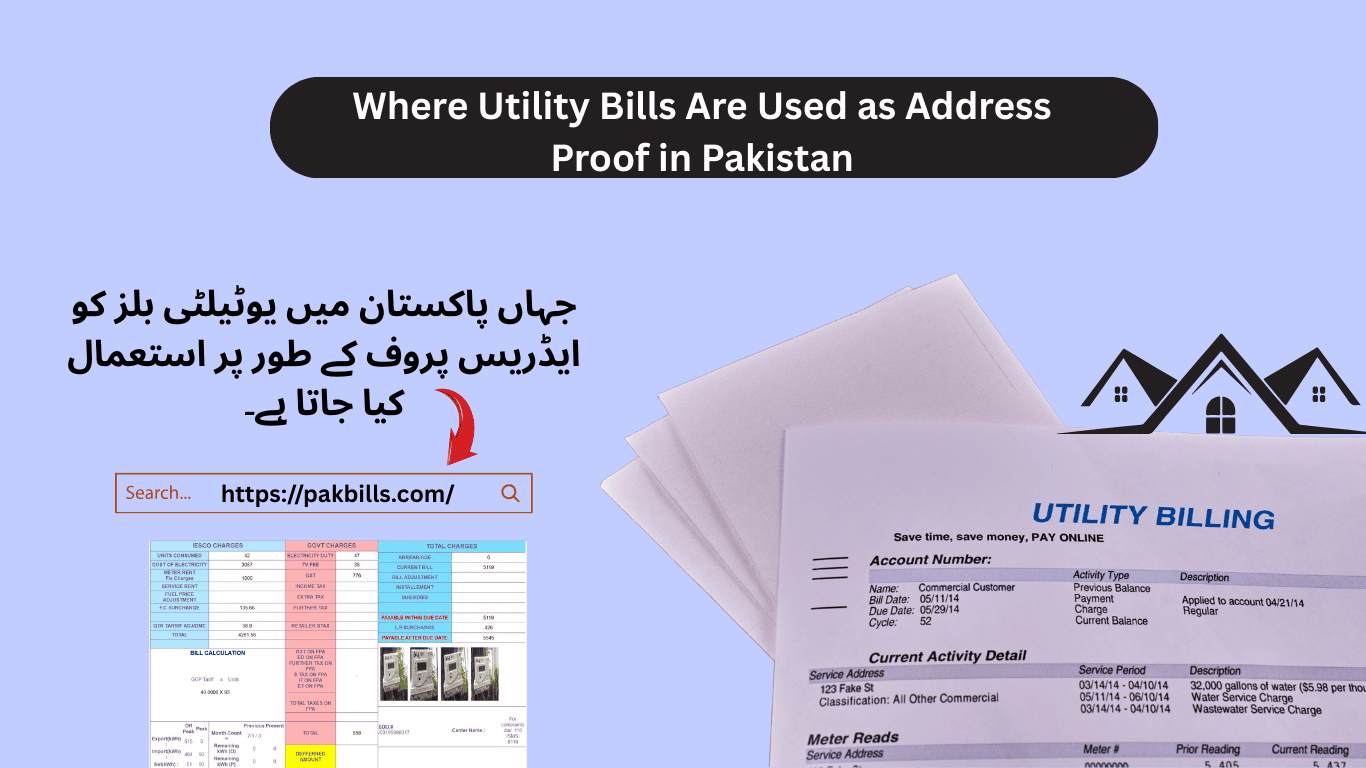In Pakistan, proving your residential address is a requirement for many official and financial processes. From opening a bank account to applying for a CNIC, a valid proof of address is crucial. Among the various documents accepted, utility bills (electricity, gas, water, internet) are one of the most widely recognized and accessible forms of address proof. In this comprehensive guide, we’ll explain how and where you can use utility bills for address verification in Pakistan.
Why Are Utility Bills Accepted as Proof of Address?
Utility bills are considered credible because they are:
- Issued regularly by authorized service providers
- Display your full name and residential address
- Officially dated, helping confirm your recent residence
- Accepted by both private and government institutions
They provide a traceable, time-stamped link between a person and a physical address, making them ideal for verification.
Types of Utility Bills Accepted
When using a utility bill as address proof, make sure it is from a recognized provider and meets the institution’s criteria. Commonly accepted bills include:
- Electricity bills (e.g., MEPCO, LESCO, K-Electric)
- Gas bills (SNGPL, SSGC)
- Water bills
- PTCL landline or broadband bills
- Internet provider bills
Note: Mobile phone bills are not universally accepted as address proof.
Where Utility Bills Are Used as Address Proof in Pakistan
Here are common institutions and situations where utility bills are accepted:
Banks: Required when opening accounts or updating KYC (Know Your Customer) information.
NADRA: For processing CNICs, B-Forms, and Family Registration Certificates.
Passport offices: As part of the identity and address verification process.
Telecom providers: When registering or re-verifying SIM cards.
Educational institutions: During admissions and document verifications.
Government offices: For applying to welfare schemes or property-related matters.
Property and rental agreements: Utility bills help in verifying tenant identity.
Need to verify your latest address or proof? You can explore bill checking services here to access a variety of utility tools in one place.
What Makes a Utility Bill Valid for Address Proof?
Before submitting your bill as proof, ensure the following:
- Recent Date: Usually within the last 3 months
- Clear Name & Address: Your name and current residential address must be visible
- Legible Format: Must be printed or original digital copy (no handwritten alterations)
- Service Provider Logo: The bill must clearly indicate a verified provider issues it
Additional tips:
- Keep multiple utility bills handy for various uses
- File them digitally for easy access when needed
How to Obtain a Valid Utility Bill
If you’ve misplaced your bill or need a recent copy, you can:
- Download from your provider’s website (electricity, gas, water)
- Visit the nearest customer service center
- Use an online duplicate bill service
You can check your latest electricity bill online quickly using just your reference number.
Additional Tip:
For mobile users or those who travel frequently, saving utility bills in cloud storage (like Google Drive) ensures you can present them anytime, anywhere.
Tips When Submitting Utility Bills as Address Proof
To ensure a smooth verification process:
- Submit a printed or well-formatted PDF copy
- Ensure the name on the bill matches your CNIC or supporting documents
- If the bill is under a family member’s name, include a supporting document (like CNIC showing family relation)
- Submit additional proof (e.g., rental agreement, CNIC copy) if required by the authority
Common Mistakes to Avoid:
- Submitting outdated bills
- Using altered or illegible bills
- Sending screenshots or partial images
Legal Context & Compliance
Certain government entities require utility bills for:
- NADRA verifications (especially during relocations)
- FIA/Police clearance documentation
- Educational scholarships and residence verification
- Corporate onboarding (in HR and finance sectors)
Utility bills have legal weight in court proceedings related to:
- Rental disputes
- Property succession cases
- Domestic abuse shelter proofs
Alternatives to Utility Bills (When Not Available)
If you don’t have access to a utility bill, consider:
- Rental agreement + CNIC of the property owner
- Affidavit from the property owner with utility copy
- Letter from employer (with address and official seal)
- Bank statement showing residential address
These can often supplement or substitute a utility bill.
Bonus: Learn to Decode Your Monthly Utility Charges
Understanding what each section of your utility bill means is key to using it correctly. For a complete breakdown, read our blog on how to decode electricity charges in Pakistan.
FAQs
Can I use a utility bill if it’s not in my name?
Yes, but you may need additional documents, such as a rental agreement or a CNIC copy showing your relationship with the bill holder.
What if I don’t receive paper bills?
You can use digital copies downloaded from official websites. These are accepted as long as they meet the criteria.
How recent must the bill be?
Most institutions require a bill issued within the last 90 days.
What if I live in a joint family system?
Could you submit the bill with a declaration letter and supporting documents linking you to the address?
Do utility bills help in loan applications?
Yes, banks often use utility bills to verify your permanent address for home, car, or personal loans.
Conclusion
Utility bills are not just payment reminders—they’re powerful tools for identity and address verification in Pakistan. As long as your bill is recent, accurate, and properly formatted, it can be used for various legal, governmental, and financial procedures.
Want to keep track of your monthly energy consumption? Try our smart electricity usage estimator to plan your budget efficiently.


Leave a Comment